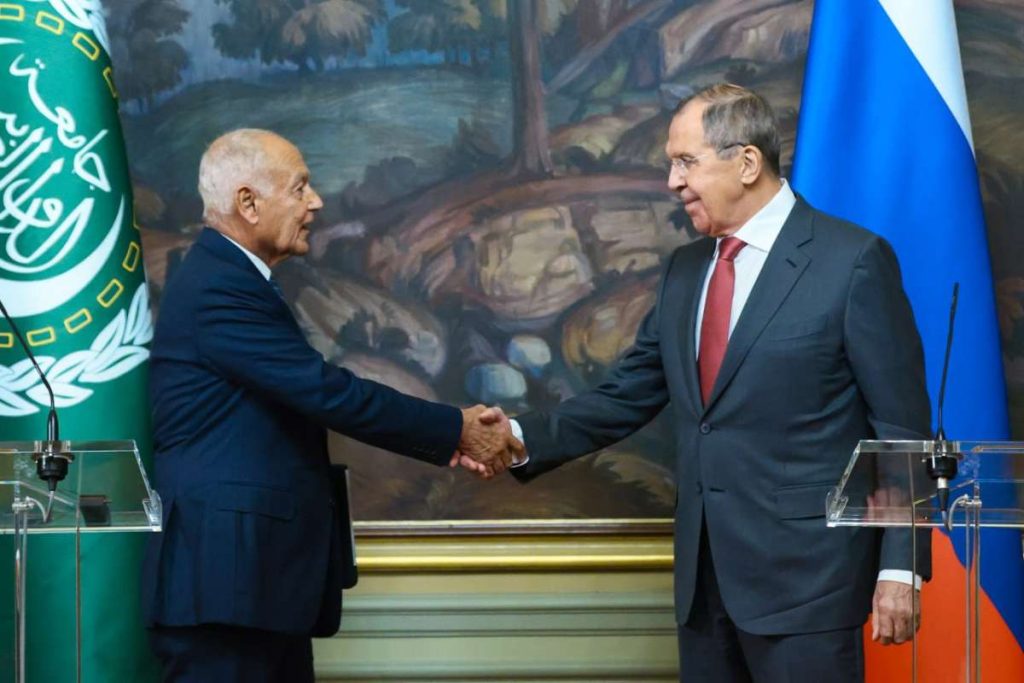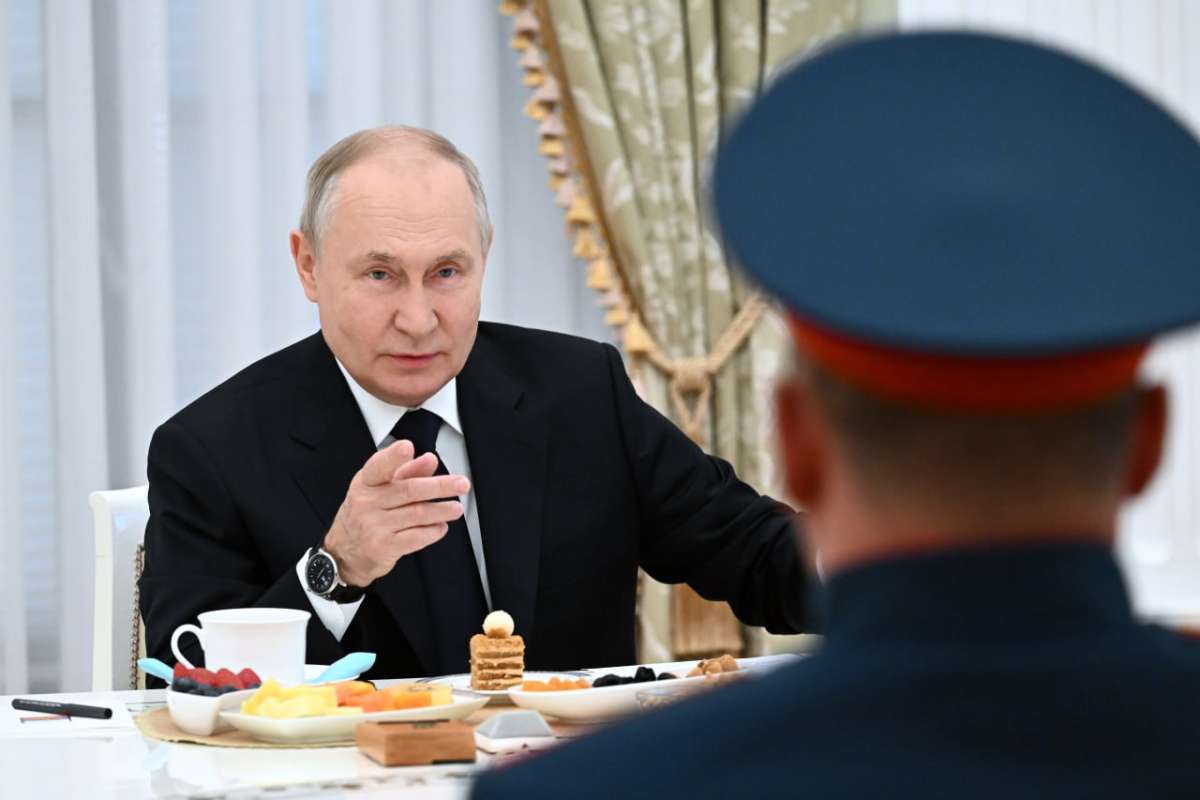Moscow’s approach towards the Israel-Hamas war, reflects an intention to achieve diplomatic balance among the two involved actors, without establishing any formal alliance in this war, writes Anant Mishra
As the Israel-Hamas war completes one month, Gaza remains a witness to a constant siege that has left countless civilians dead, with casualties mounting to over 300 Israeli Defence Forces killed. As human rights organizations condemn Israeli military encirclement of Gaza, civil society groups including Human Rights Watch term Israeli Defence Force offensives as a punishment even branding Israel as a war criminal, calling for international pressure to put an end to this siege, which threatens the lives of countless Palestinians trapped in an enclave.
With battle raging on, Moscow, which enjoys diplomatic relationship with Tel Aviv and engages with Hamas as well joins the list of countries that has refused to designate it a terror organization, maintaining a cautious response throughout the war. In fact, Moscow’s approach towards the Israel-Hamas war, reflects an intention to achieve diplomatic balance among the two involved actors, without establishing any formal alliance in this war. This is reflected from President Putin’s condemnation of violence induced by both Hamas and Israeli side and putting a blaming Washington’s failing diplomacy in the Middle East.
That said, President Putin has made his government’s position evident, when he reiterates the formation of the state of Palestine as necessary without having to choose between Iran and Israel.

Tracing Moscow’s diplomacy
To prevent an end to this war, Moscow’s diplomacy can be traced back to Permanent Representative of Russia to the United Nations Vassily Nebenzia’s, call for a humanitarian ceasefire on October 13, while presenting a draft resolution to the UN Security Council, condemning all hostilities targeted against civilians and acts of violence including terrorism. Taking a usual Muscovite stand, he blamed Washington for not sharing the responsibility of war and went on to blame Brussels on ignoring the violence induced by Irseali Defence Forces aircraft against innocent Gazans.
With the draft resolution facing a unanimous rejection from the UN Security Council, impact of rage in Moscow was reflected in Ambassador Nebenzia speech, where he condemned the Western bloc with nefarious intentions by preventing the draft resolution to pass. That said, since October 7 Moscow has established dialogue with Egypt, Iraq, Lebanon discussing various magnitudes of this crisis, including spillover effect on the region, prospective conditions for a ceasefire and growing Palestinian humanitarian crisis in the region.
By deeply engaging with regional players in the Middle East, Moscow may diversify politico-economic partnerships in the background of the Israel-Hamas war. The Israel-Palestine issue provides unique opportunity for Moscow to re-engage with Arab states at multilateral, bilateral or through existing regional platforms for greater dialogues. Once such example being Moscow’s economic engagement with Iraq, where it may serve the purpose of not only harnessing local Palestinian support but also strengthening greater politico-economic engagement, with an intent to reap greater benefits in the OPEC plus.
Interestingly, post Hamas ’execution of Operation al-Aqsa Flood, President Putin did not call Prime Minister Benjamin Netanyahu and did not condole Israeli losses or expressed grief. Taking note of deepening relationship between Moscow and Tel Aviv over the years, which was reflected in Israel refraining on taking a Western perspective on Russia’s invasion of Ukraine, Moscow did not reciprocate similar warmth to Israelis after Hamas’ unprecedented attack against Israeli settlements.
That said, Moscow is aiming to present a perfect solution by bringing ceasefire, even if it means momentarily, with a long term aim to host Hamas and Tel Aviv on a discussion table under Moscow’s initiative. It is desperate to implement a ceasefire, hence its eagerness to push UN Security Council for opening temporary engagement with the two parties. It hopes to exercise some leverage over Hamas and Tel Aviv, presenting itself as the perfect mediator, camouflaging strategic interests in the region.
With escalating violence, will a strategic balance fulfil Russia’s national interest in the region? For Moscow, engaging in Israel-Palestine conflict may prove to be counterproductive with an outcome which is nothing but unpredictable.
Predicting Moscow’s political gain
The Israel-Hamas war came at a time when US and its allies were invested strategically and militarily in Ukraine, which will relieve some pressure on Moscow. The extent of Washington’s engagement in the Middle East will also mean distraction from Russia’s on-going military engagement and its ability to engage Ukrainian military in battle. It will not be incorrect to say that, the Israel-Hamas war has given some moments of joy to military planners in Kremlin. Taking the note of on-going debates in the US Congress and elsewhere in Europe, President Putin has many causes to celebrate. One being, political leaders in the West calling for diversion of military and financial aid from Ukraine to Israel. If that happens, Kremlin’s military engagement will become fiercer, with more armour and APCs surviving the battle.
If that happens, political leadership in Washington may be forced to take such calculative measures of diverting US arms deliveries to Israel, cutting the existing military aid to Ukraine to benefit Israel. According to one scholar, who teaches Art of War at US Command & General Staff College, called this a meagre hypothesis, which will have no impact on Kiev as Washington may not divert the number of weapons as estimated, without impacting its arms distribution to Kiev. That said, tracing the trajectory of violence enraging every day, one may argue where Israel would require additional support in terms of weapons and finish the war in few days.
Strategically, Moscow’s balance can be interpreted as a sincere appeal to Southern/Eastern Economies filling the vacuum of power wherever necessary while posing as an alternate to Washington, which is evident in its decision by entering into Middle East political arena with a balancing act. Moscow aims to become a champion of the Israel-Palestinian cause, harnessing the essence of dissatisfaction within the Arab world while sowing the seeds of anti-American sentiments as a part of its pan-Arab policy. With anti-western propaganda is already fuelling certain Arab states, Moscow aims to capitalise from such sentiments by creating a narrative laid on a sense of abandonment by the West, particularly Washington, in the global arena.
That said, Moscow’s continued stance of a two state-solution makes it perfect to foster relationship independently and pose as a perfect entity to facilitate ceasefire negotiations without alienating the Arab or the international community. By negotiating a ceasefire, it will emerge from the shadows of an isolated state, demonstrating its diplomatic heft to influence the Middel East, thereby mocking the West. By presenting an alternate to Washington, Moscow aims to strengthen its soft power diplomacy in the Middle East, instilling trust in the eyes of the Global South by negotiating peace between Israel and Palestine, while demonstrating its resolve to Palestinian cause.

Mapping concerns for Moscow
By idolising itself as the champion for Palestinian cause, the Israel-Hamas war may prove to bring more troubles for Moscow than it anticipates. It is highly unlikely to project concerns expressed by Moscow on a possible spillover in the Middle East, how will escalation of violence in Gaza impacts Lebanon and Syria, will pose a serious challenge to Moscow’s soft power diplomacy in the region.
Forecasting a possible escalated engagement between Hezbollah and Israel (short of war), Hezbollah may need to reorganise its fighting strengths, which will involve abandoning its efforts from Syria and focussing on securing Lebanon. Such a scenario could potentially challenge Assad regime, weakening its flanks militarily, forcing public unrest in the light of greave economic hardships. This could force Moscow to provide substantial reinforcement to Assad regime (it could employ paramilitary forces or private military contractors) if situations deteriorate. This means, with Ukraine war still on-going, Moscow will be forced to divert it forces on two subsequent fronts. It remains unclear whether Moscow will divert its attention to achieve formidable outcome in the Israel-Hezbollah war, but lessons drawn from Moscow’s engagement in the Armenia-Azerbaijan war, reflects otherwise.
That said, Moscow has always been vocal about maintaining close relations with Israel and Iran. In case of a direct confrontation between Tehran and Tel Aviv, it is difficult to predict Moscow’s response, even if it means measuring its optimism to maintain greater relations with the two nations. It is safe to say that, even Moscow does not wish to be in a spot that forces them to choose between Tel Aviv or Tehran. The growing anti-Israeli sentiments in Russia point towards the rise of ultra-nationalists, which have been promoting pro-Iranian narratives since October 7 attack. It remains unclear on how far Moscow will go to balance its relations between the two states.
Furthermore, a direct confrontation between Tel Aviv and Tehran could result in greater Iranian focus on the region which may weaken IRGC’s potential support to Moscow’s war efforts on the Ukrainian front. This could mean fewer number of Iranian drones in Ukrainian airspace. That said, a potential conflict between Israel and Iran would seemingly engulf the entire Middle East, forcing Moscow to keep a watchful eye on potential spillover impact on members of the Gulf Cooperation Council (GCC) and Saudi Arabia & United Arab Emirates (UAE), in particular.
In the context of a pan-Arabian perspective, any escalation in the Israel-Hamas war weakens Moscow’s efforts in the region. As its repeated calls for ceasefire remains unheard, any further delay in peaceful negotiations between Israel and Palestine will force Arab states to only to question Moscow’s policy in the Middle East but mock it for its clouded judgement over possible peace negotiations in the region under its leadership.
With that, as the violence escalates in Gaza, will the war impact Moscow’s ambitious policy of maintaining perspective balance, benefit pan-Aarab states or bring more harm to its national interest? It is still too early to predict the impact of Israel-Hamas war on Moscow’s Middle East policy. But keeping Russia-Ukraine war and the perspective of a potential Israel-Hezbollah conflict in hindsight, Moscow’s approach to Israel-Hamas war will be of extreme caution.
(Anant Mishra specialises on Afghanistan, where he has served three combat deployments. He was adviser to key military and civilian leaders of the Ashraf Ghani government. Views expressed are personal and exclusive to India Narrative)

